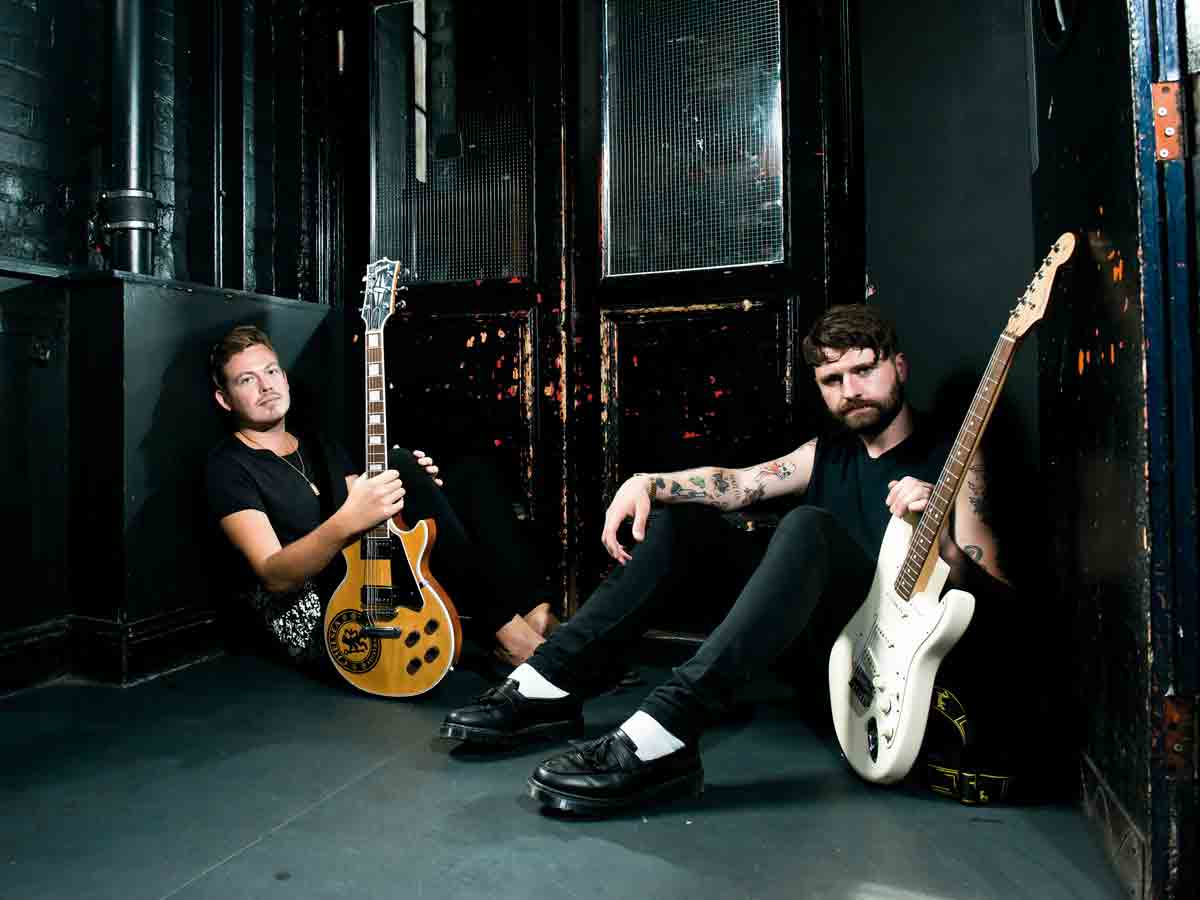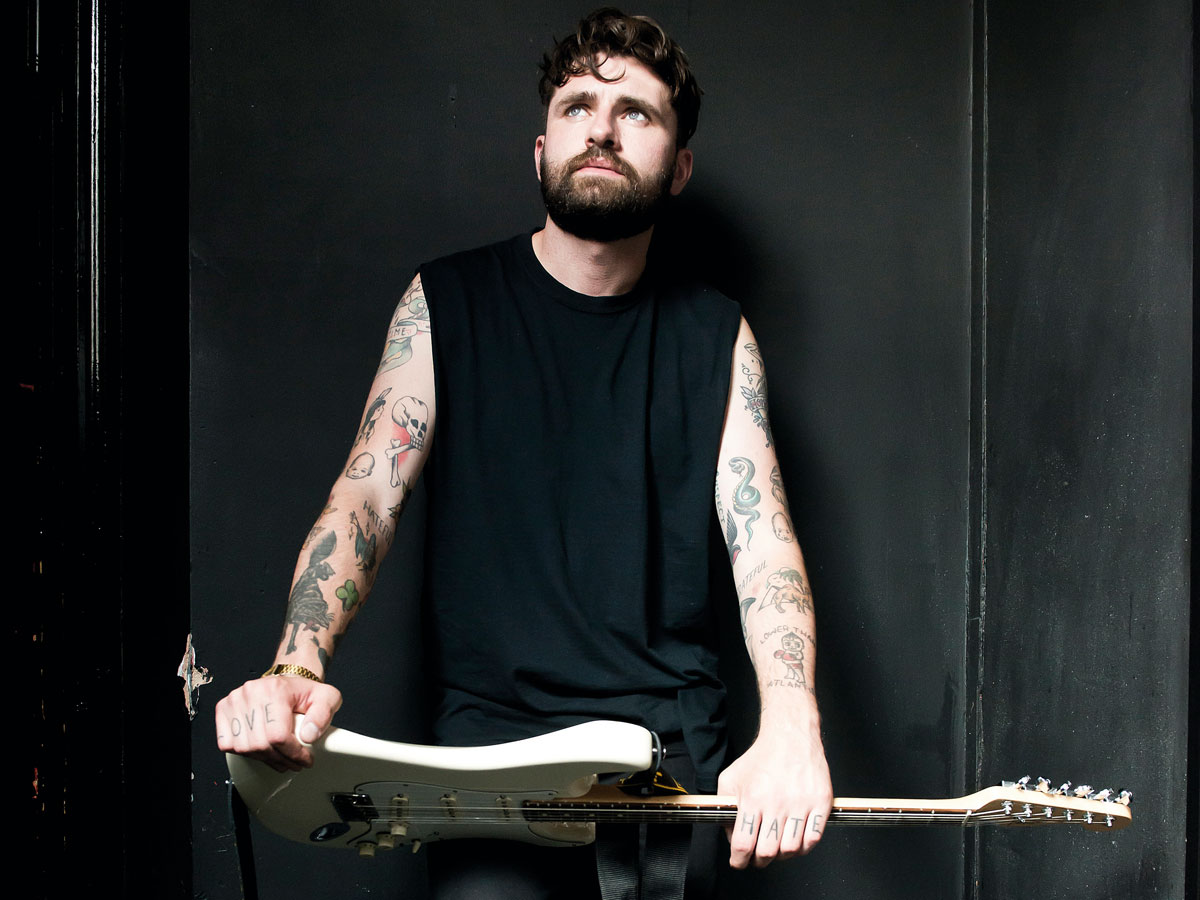Lower Than Atlantis on labels, lows and tough lessons
"We thought everything we touched would turn to gold"

A tough start
The last time we met Lower Than Atlantis it was 2012 and we were on the roof terrace of Island Records’ Kensington HQ. The sun was shining and ambitions for their major-label debut, Changing Tune, were sky-high.
However, it was not to be: the record did not live up to label expectations and, like many before them, the alternative rock four-piece found themselves cut adrift.
Unsure of their next step, the band regrouped in Watford and savvily used the remainder of their advance to build a studio in which they were able to spend a year honing their best record yet – the self-titled Lower Than Atlantis.
We catch up with guitarists Mike Duce and Ben Sansom to discuss the highs and lows of the last two years, saying no to the yes men and how to make a bigger album on a smaller budget...
Prior to this record, it seemed the pressures of being in a band were weighing on you. What was going on?
Mike: “We’d parted ways with our label, and our manager jumped ship, and we just felt kind of alone. It felt like, ‘Do we want to carry on doing it? And would anyone care if we did?’”
Ben: “The confidence at the end of the campaign last time was rock bottom. It wasn’t that it wasn’t a success, the last record, it was just that we’d had so much pressure on us. They [Island Records] wanted us to be almost as popular as a pop band and it was just never going to happen. Jumping from World Record, we had to have an album that still ‘rocked’.”
Mike: “The album we have now, we couldn’t have done that when we first signed because everybody would have been like, ‘Well, you’ve had influence from somewhere and you’ve sold out.’”
"Essentially, we’d just been dropped. It was just: ‘Boom!’" - Mike Duce
What’s your worst memory from that time?
Ben: “There were low, low moments. Just some of the meetings we had...”
Mike: “Our manager went in to have a meeting with Island to find out the budget for our next album. We were getting excited in the pub, like, ‘Ooh, where can we go? Who could do it?’ Then she goes, ‘Err, interesting chat... they don’t really wanna do it.’
[It became clear] that it would be minimum marketing spend, minimum album costs – less than we would spend ourselves. Essentially, we’d just been dropped. It was just: ‘Boom!’”
Do you feel you were at fault at all?
Mike: “There are always two sides, and I’m sure we were. We had a manager that was telling us we were going to be the next Beatles. He used to say [adopts American accent], ‘If you wanna throw a fuckin’ chair through a window - throw the fuckin’ chair through the window! I’ll pick up the pieces. That’s what I’m here for!’ He was encouraging us to be massive dickheads.”
Ben: “We thought everything we touched would turn to gold. There wasn’t a rigorous quality control. But that’s also the label’s job, to say no. There are two sides to the story. I guess we should have maybe worked harder.”
Was the experience beneficial?
Mike: “It’s turned into such a positive thing. Since that happened, we’ve built a recording studio and had a great experience hanging out with our friends and recording the album in our own studio, then got signed to a label [Sony] that are big fans of us and, already, from one song in, they obviously know what they’re doing with a rock band. Here We Go has been our biggest song to date.”
Ben: “I know for a fact that this album wouldn’t be like this if that hadn’t happened. We fine-tooth combed everything. It had to be perfect before it would even be considered for the record. That was because of what happened to us. It upset us in so many ways, but it also fired us up and made us improve.”

Taking matters into their own hands
How did recording in your own studio impact your performances?
Mike: “It was good being in a familiar environment and our friend, Dan Lancaster, was recording it, and he’s best at getting the best possible take. He’d be like: ‘That was shit. You’ve got to do it again.’ There’s no bullshit.”
Ben: “It was mental how long we’d spend just tuning guitars, before we’d even started.”
Mike: “[Normally], when you’re in the studio, it costs so much to hire, and the producer costs money as well, so [when you make a mistake when recording] you’re like, ‘Ahhh! I’m costing everyone money!’ But when you’re in your own space, you can be like, ‘If I want to spend a week doing this then I just will.’”
“Ben had this crazy week of finding studio gear on Gumtree for pennies. We’d drive around picking it all up" - Mike Duce
Financially speaking, how did setting up your own studio compare to the money you’d spend going to another facility?
Mike: “It was a fraction.”
Ben: “It was our friend who had the space and it wasn’t even a room, it was a corner! ”
Mike: “Then Ben had this crazy week of finding studio gear on Gumtree for pennies. We’d drive around picking it all up and then haggle on it again when we got there.”
Ben: “We got an old tape machine, an old 80s desk, which has great preamps in it, but was so cheap. Originally, we just wanted a storage space for our equipment, and that changed into a storage and rehearsal room, then it changed to storage, rehearsal and recording studio, so it was perfect.”
Having used your own gear on the record, is it easier to play these songs live?
Mike: “Yeah. Before, I would just use whatever was in the studio and then, live, just use a drop-D guitar and a drop-C guitar, whereas now I actually use the same guitars for songs as I did in the studio. I’ve got the selectors for the pickups glued in to where they were when I used them for those songs. So my Jap Strat is on the neck pickup and then my white Strat, which is on Here We Go, is all the way on the bridge.”
Ben: “I’m the same, I used the same two Les Pauls in the studio as I am now: a 1976 Custom for the drop-C and a new natural wood Classic Custom for D.”
Mike: “[Amps-wise] I used the JCM800 for clean stuff, and I now use that as my live clean amp, because of this album. And then my JCM900, old faithful, for distortion.”
Ben: “I’m using an Axe-Fx II going into a [Marshall EL84] power amp, and that’s going into a Marshall cab. Then the Axe-Fx II has another output for all my cleans, and has no amp simulator, it goes straight to a Marshall Bluesbreaker, so I’m splitting them. It’s similar to what Mike’s doing with the heads.”

Looking ahead
It feels as if your 90s alt-rock influences have been brought to the fore. Were you channeling any guitarists in particular?
Mike: “Definitely. I always like the Smashing Pumpkins thing of the chunky Les Paul and the jingle-jangle of the Strat on top.”
Ben: “It’s like the real simple chords and then the interesting voicings. It was more free roaming before.”
Mike: “Both our chord voicings used to be different all the time, but there was no need.” Ben: “Yeah, when you listen to it, it was just like someone on a piano going, ‘These are in the same key! PLUNG!’ So that [simpler chord voicing] was cool.”
"We’ve learned from our mistakes and the ball is very much in our court now.”" - Mike Duce
How do you feel about each other as a band?
Mike: “Morale has never been higher. We’ve learned from our mistakes and the ball is very much in our court now.”
Ben: “I feel like we were always chasing stuff up before, having to be like, ‘Why hasn’t this happened?’ and having stuff going wrong. Whereas with the team we’ve got now, I don’t feel that at all, because I know we’re working with people we trust, and our manager and our label are so ahead of us.”
Mike: “Yeah, and then all you have to worry about is making the best music you can and having fun - the important shit.”
Ahead of Changing Tune, ambitions were high. You told us you wanted to play not just arenas, but “EARTH”.
Ben: “Oh god.”
Mike: “[Shakes head] That sounds like something I would have said...”
Ben: “Ha! ‘Mike Duce, 2012’!”
Is that still the case?
Mike: “Nah. We haven’t set ourselves any goals, man.”
How will you measure the success of this record?
Ben: “Just to see your band grow, really. The last one felt like it stayed on a steady level, so now I feel like we need to keep it going.”
Mike: “It’s already surpassed my expectations, just on this one single, but as long as we’re still mates, we’re still having a laugh, and getting to travel, that would be a success for me.”
Want more Lower Than Atlantis? Check out our exclusive studio tour video...
TYPE: YouTube | CAPTION: null | SRC: http://www.youtube.com/watch?v=XUHPsnWLNgs | WIDTH: 460 | HEIGHT: 300. (Click the Edit Attributes/Cog button with cursor placed in this area to edit this tag.)
Matt is a freelance journalist who has spent the last decade interviewing musicians for the likes of Total Guitar, Guitarist, Guitar World, MusicRadar, NME.com, DJ Mag and Electronic Sound. In 2020, he launched CreativeMoney.co.uk, which aims to share the ideas that make creative lifestyles more sustainable. He plays guitar, but should not be allowed near your delay pedals.


